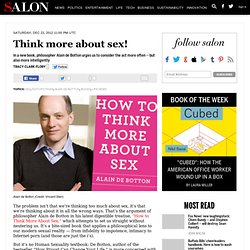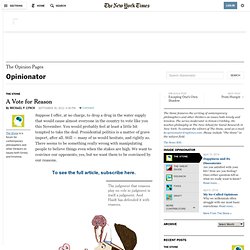

Think more about sex! The problem isn’t that we’re thinking too much about sex, it’s that we’re thinking about it in all the wrong ways.

That’s the argument of philosopher Alain de Botton in his latest digestible treatise, “How to Think More About Sex,” which attempts to set us straight without neutering us. It’s a bite-sized book that applies a philosophical lens to our modern sexual reality — from infidelity to impotence, intimacy to Internet porn (and those are just the i’s). But it’s no Human Sexuality textbook: De Botton, author of the bestseller “How Proust Can Change Your Life,” is more concerned with big ideas than hard evidence. For example, he writes, “The more closely we analyze what we consider ‘sexy,’ the more clearly we will understand that eroticism is the feeling of excitement we experience at finding another human being who shares our values and our sense of the meaning of existence.”
This seems intuitively true and wise, doesn’t it? And why is it so “constitutionally problematic”? No. A Vote for Reason. The Stone is a forum for contemporary philosophers and other thinkers on issues both timely and timeless.

Suppose I offer, at no charge, to drop a drug in the water supply that would cause almost everyone in the country to vote like you this November. You would probably feel at least a little bit tempted to take the deal. Presidential politics is a matter of grave import, after all. Still — many of us would hesitate, and rightly so. There seems to be something really wrong with manipulating people to believe things even when the stakes are high. The judgment that reasons play no role in judgment is itself a judgment. This hope that exchanging reasons matters, not just for what it gets us but in itself is as old as Plato, but it has often been derided as something of a muddle-headed fantasy, as “nothing but dreams and smoke” as Montaigne put it in the 16th century. Recently, however, some social scientists, most notably the psychologist Jonathan Haidt, have upped the cynical ante.
Love, Yiddish, and the Problem of Bioethics. Darren J.

Beattie A mother and her son were traveling on a bus in Israel. The child chattered away in Hebrew while the mother admonished, “Yiddish, Yiddish, speak Yiddish!” The son continued to talk in Hebrew while the mother kept insisting that the child speak Yiddish. A man who was sitting nearby piped up, “Excuse me, lady, but why do you insist that your son speak Yiddish?” “I don’t want him to forget that he’s Jewish,” answered mama. To think about ethics necessarily involves thinking about where lines should be drawn — which actions are right and which are wrong. Of course, separating scientific theorizing from experimentation is hardly simple. Bioethics at its best is not, in any event, concerned primarily with actions themselves, but rather with the meaning of actions — that is, with the kind of thinking about the world that actions both reflect and reinforce.
Yet bioethics tends not to explore the question of what motivates scientific inquiry. A Curious Creature Fruit of Forbidding.